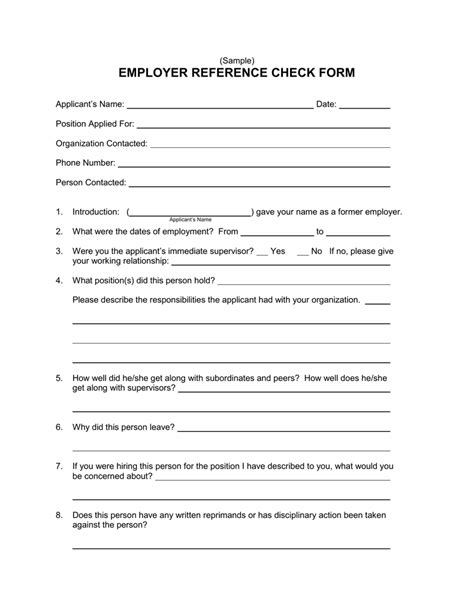Unveiling Reference Checks: What Employers Verify

Reference checks are an essential step in the hiring process. They allow employers to verify the information provided by candidates and ensure that they are the right fit for the job. In this post, we will be discussing what employers typically verify during reference checks and why it matters. We will also provide practical tips for job seekers to prepare for reference checks and increase their chances of getting hired.
What are reference checks?
Reference checks are a process where employers contact the listed references of a job candidate to verify their employment history, job performance, and other relevant information. Employers may also ask for additional references if they want to gather more information about the candidate’s skills, work ethic, and character.
Why do employers conduct reference checks?
Employers conduct reference checks for various reasons:
- To verify the accuracy of the information provided by the candidate on their resume or application form.
- To assess the candidate’s job performance, work ethic, and skills from the perspective of their previous employers or colleagues.
- To identify any potential red flags or areas of concern that may affect the candidate’s suitability for the job.
- To ensure that the candidate has the necessary qualifications, experience, and personality traits to perform the job successfully.
What do employers verify during reference checks?
Employers may verify various aspects of a candidate’s background during reference checks:
Employment history
Employers may contact the candidate’s previous employers to verify the following:
- Employment dates
- Job title
- Job responsibilities
- Reason for leaving
- Eligibility for rehire
Job performance
Employers may ask the candidate’s previous supervisors or colleagues about their job performance, including:
- Strengths and weaknesses
- Skills and abilities
- Work habits and attitude
- Communication and teamwork
- Attendance and punctuality
Character and personality
Employers may also ask references about the candidate’s character and personality, including:
- Integrity and honesty
- Reliability and trustworthiness
- Interpersonal skills
- Leadership potential
- Conflict resolution skills
How do employers conduct reference checks?
Employers may conduct reference checks in various ways:
- Phone calls
- Emails
- Online forms
- Reference letters
Employers may also use third-party reference checking services that specialize in verifying employment and education history, criminal records, and other background information.
How can job seekers prepare for reference checks?
Job seekers can take the following steps to prepare for reference checks:
- Choose references who can provide relevant and positive information about their skills and experience.
- Notify their references in advance and ask for their permission to use them as references.
- Provide their references with a copy of their resume and job description to help them prepare for the reference check.
- Follow up with their references after the reference check to thank them and provide an update on their job search.
Conclusion
Reference checks are an important part of the hiring process that allow employers to verify the information provided by job candidates and assess their suitability for the job. By understanding what employers typically verify during reference checks and how to prepare for them, job seekers can increase their chances of getting hired. Remember to choose your references carefully and provide them with the necessary information to help them provide a positive and accurate assessment of your skills and experience.
FAQs
What is the purpose of reference checks?
The purpose of reference checks is to verify the information provided by job candidates and assess their suitability for the job based on their employment history, job performance, and character.
Who can be a reference?
References can be previous employers, colleagues, supervisors, teachers, mentors, or other professionals who can provide relevant and positive information about the candidate’s skills and experience.
What questions do employers ask during reference checks?
Employers may ask various questions during reference checks, including the candidate’s employment history, job performance, skills and abilities, work habits and attitude, communication and teamwork, and character and personality.
Can employers contact references without permission?
No, employers should always ask for the candidate’s permission before contacting their references. Candidates may choose to withhold certain references or provide alternative references if they are not comfortable with their previous employers being contacted.
What if a reference provides negative feedback?
If a reference provides negative feedback, employers may use this information to assess the candidate’s suitability for the job. However, they should also consider the context of the feedback and verify its accuracy before making a final decision.
